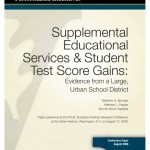Supplemental Education Services and Student Test Score Gains: Evidence from a Large Urban School District
 This study examines the effect of SES on student test score gains and whether particular subgroups of students benefit more from NCLB tutoring services. The sample used includes information on students enrolled in 3rd through 8th grades nested in 121 elementary and middle schools over a five-year period from 2003-04 to 2007-08. A total of 17 elementary and middle schools were required to offer SES at some point during the period under study, and 9,861 student-year pairings in the sample were eligible to receive SES. While the authors’ preferred analytic approach takes advantage of panel data to implement an analysis strategy with student fixed effect regression methods, they also test the robustness of these estimates to a number of alternative approaches, including a comparison of student test score gains between current and future SES participants. The authors find consistently significant and positive average effects of SES on test score gains in mathematics. Results in reading tend to be insignificant. SES tutoring does not appear to disproportionately benefit a particular racial/ethnic group or ability level. Female students and students with disabilities appear to benefit more from participating in SES. SES has a significant, cumulative effect on students in both mathematics and reading. They also demonstrate that not accounting for content area of tutoring can cause downward bias in estimates of the SES treatment effect. These findings are qualified on a couple of dimensions.
This study examines the effect of SES on student test score gains and whether particular subgroups of students benefit more from NCLB tutoring services. The sample used includes information on students enrolled in 3rd through 8th grades nested in 121 elementary and middle schools over a five-year period from 2003-04 to 2007-08. A total of 17 elementary and middle schools were required to offer SES at some point during the period under study, and 9,861 student-year pairings in the sample were eligible to receive SES. While the authors’ preferred analytic approach takes advantage of panel data to implement an analysis strategy with student fixed effect regression methods, they also test the robustness of these estimates to a number of alternative approaches, including a comparison of student test score gains between current and future SES participants. The authors find consistently significant and positive average effects of SES on test score gains in mathematics. Results in reading tend to be insignificant. SES tutoring does not appear to disproportionately benefit a particular racial/ethnic group or ability level. Female students and students with disabilities appear to benefit more from participating in SES. SES has a significant, cumulative effect on students in both mathematics and reading. They also demonstrate that not accounting for content area of tutoring can cause downward bias in estimates of the SES treatment effect. These findings are qualified on a couple of dimensions.
To view a copy of this paper, please click here.
To view a copy of this presentation, please click here.
Connect with Vanderbilt
©2024 Vanderbilt University ·
Site Development: University Web Communications